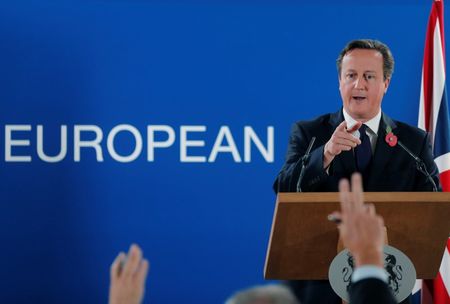By William James
LONDON (Reuters) - British Prime Minister David Cameron's hopes of enshrining into law his promise of a referendum on European Union membership have collapsed after lawmakers said late on Tuesday that his Liberal Democrat coalition partners had blocked the legislation.
Cameron wants to renegotiate Britain's ties with Europe and hold a referendum by 2017, while the Liberal Democrats and the opposition Labour party say a vote would be destabilizing.
Both Labour and the Liberal Democrats say they would only hold a referendum if the balance of power in the bloc was significantly altered.
The collapse, news of which emerged after private negotiations, does not prevent Cameron holding a referendum if he wins the 2015 election but will anger rebellious eurosceptics among his Conservatives, threatening the unity within the party.
The bill's failure will also damage Cameron's hopes of persuading voters and lawmakers not to defect to the anti-EU UK Independence Party (UKIP).
Cameron had hoped to push through laws guaranteeing a referendum by 2017 using a bill sponsored privately by one of his lawmakers - an unorthodox route that removed the need for draft laws to have the backing of both coalition partners.
The Liberal Democrats said they were ready to let lawmakers vote on the issue even though they disagreed with the bill.
However, that approach was scuppered when the Liberal Democrats rejected the fine print of a deal that would have given the referendum bill the green light to progress through parliament in exchange for allowing a piece of legislation, privately sponsored by one of their own lawmakers, to proceed.
"The Lib Dems have killed off our chances of putting into law, this side of an election, an in-out EU referendum by 2017," said Conservative lawmaker Bob Neill, the bill's sponsor.
"They have used Westminster tricks to try to deny the British people a say on their membership of the EU."
The chances of the bill passing into law were already slim after a similar bid failed in January when the upper house of parliament filibustered the legislation during its latter stages.
The Liberal Democrats said Cameron's party were trying to make them scapegoats for the failure of the bill, saying the deal they were offered came with the unacceptable condition of allotting government-allocated parliamentary time to the EU bill.
The value of the law, even if passed, would have been largely symbolic as it could have been repealed if the opposition Labour party had won power at next year's election.
But, for Cameron, success would have helped hold together his party, which is deeply divided over Britain's EU membership, and was seen as a way to address the concerns of eurosceptic voters who have switched allegiance to UKIP.
UKIP, which wants for an immediate EU withdrawal, recently won its first elected seat in parliament after a lawmaker defected from the Conservatives, saying that Cameron was not serious about reforming Britain's relationship with the EU.

Opinion polls show UKIP with its highest ever levels of support, largely at the expense of the Conservatives, threatening Cameron's chances of winning the 2015 vote. That will be put to the test on Nov. 20 when the second lawmaker to defect to UKIP seeks re-election, standing against a Conservative.
(Editing by Louise Ireland)
